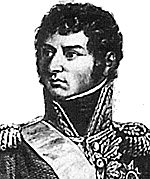Bernadotte 1806
Is There A Case For The Defence?
The Villain: Jean Baptiste Jules Bernadotte 1763-1844
by John Cook
| |
Promoted corporal on 16 June 1785, Bernadotte was a sergeant major by 1788 and regimental sergeant-major (adjutant) in 1789. Bernadotte was commissioned on 6 November 1791 and transferred to the 36th Anjou Regiment as a lieutenant, where he was promoted to captain in July 1793. His promotion thereafter was meteoric; in February 1794 he was promoted to lieutenant colonel, colonel in April and general of Brigade in June. On 22 October 1794 he was a general of Division. His career during the Revolutionary Wars was distinguished, serving in the Armée du Rhin, Armée du Nord under Jourdan and the Sambre et Meuse. In 1797 his Division was transferred to the Armée d'Italie were Bernadotte commanded it during Bonaparte's campaign against the Archduke Charles. Briefly Minister of War under the Directory, Bernadotte had Jacobin leanings and refused to take part in the coup of 18th Brumaire (9 November 1799); this marked the start of the decline in his relationship with Bonaparte. Nevertheless, he was named Marshal of France on 14 May 1804 and, following the Austerlitz campaign, Prince de Ponte-Corvo on 5 June 1806. Napoleon was not well pleased with his performance in 1806, where his I Corps did not take part in either of the two principal battles. He was removed from command of the predominently Saxon IX Corps after Wagram in 1809 and sent to command l'Armée d'Antwerp opposing the British landings at Walcheren. He was subsequently recalled to Vienna by Napoleon where he was dismissed on 24 September 1809. On 21 August 1810, apparently as a result of earlier chivalrous treatment of Swedish prisoners of war, he was elected Crown Prince of Sweden by the States-General. Napoleon released Bernadotte from his oath of allegiance and French nationality, and he arived in Sweden on 20 October 1810. On 5 November 1810 he was adopted by the childless and senile Charles XIII, the Swedish King. In 1812, the French army violated Swedish territory in Pomerania and Sweden became part of the Sixth Coalition against France. Bernadotte commanded a Swedish/Allied Corps during 1813 and 1814, fighting against his former master and country. He became Charles XIV Sweden and Norway on 5 February 1818 and despite an autocratic style, he retained popular support throughout his reign. Bernadotte died at Stockholm on 8 March 1844. More Bernadotte and 1806
Bernadotte and 1806: Prosecution's Case Bernadotte and 1806: Defense's Evidence Bernadotte and 1806: Defense's Case Bernadotte and 1806: The Villain: Bernadotte Bernadotte and 1806: The Hero: Davout Bernadotte and 1806: Plan A and B Maps (very slow: 288K) A Footnote To Bernadotte: Scapegoat for Intelligence Failure? Back to Table of Contents -- First Empire #48 Back to First Empire List of Issues Back to MagWeb Master Magazine List © Copyright 1999 by First Empire. This article appears in MagWeb (Magazine Web) on the Internet World Wide Web. Other military history articles and gaming articles are available at http://www.magweb.com |

 Bernadotte was born in Pau in the Basses-Pyrénées on 26 January 1763 in a "pretty, tiny house of two stories, with three windows in front and great sun-blinds, all looking so quiet and modest." He was a well educated man, the son of Henri de Bernadotte the Procurator to the Steward of Pau. As a youth he worked as a sometime postilion and, according to the postmaster in Pau, played the horn "to perfection.". His family intended that he follow in his father's footsteps and train for the law but he was determined on a military career. He enlisted in the Régiment Royal-Marine in 1780, then stationed in Corsica, and was one of a number of future marshals who came from the ranks.
Bernadotte was born in Pau in the Basses-Pyrénées on 26 January 1763 in a "pretty, tiny house of two stories, with three windows in front and great sun-blinds, all looking so quiet and modest." He was a well educated man, the son of Henri de Bernadotte the Procurator to the Steward of Pau. As a youth he worked as a sometime postilion and, according to the postmaster in Pau, played the horn "to perfection.". His family intended that he follow in his father's footsteps and train for the law but he was determined on a military career. He enlisted in the Régiment Royal-Marine in 1780, then stationed in Corsica, and was one of a number of future marshals who came from the ranks.